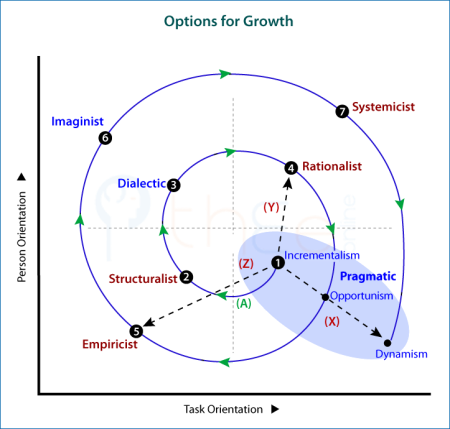The Spiral Trajectory
Management Culture
refers to refers to those values, within the organization, perceived as essential to manage staff and business activities effectively
Consulting experience has shown that the can be strengthened in a staged process. The stages are defined by value-sets (called «Modes») that derive from the .
The asks: what are our aims?
and believes in: shared values.
The asks: what are the relevant facts?
and believes in: certain knowledge.
The asks: what can I easily do now?
and believes in: immediate necessary action.
The asks: what compromise satisfies the powerful groups?
and believes in: issue resolution.
The asks: what leads to balanced development?
and believes in: inter-connections and evolution.
The asks: who is accountable for this?
and believes in: accountability and control.
The asks: what enables personal growth?
and believes in: aspirations and creative potential.
For more, see the matrix summary.
The natural sequence of Modes (value-sets) to be installed traces out a spiral trajectory of developmental Stages when plotted on the TET. The sets of values at each Stage cumulate.

The Trajectory of Change in Brief
Culture starts from the , which enables immediate necessary action. However, it soon becomes evident that some essential work is not getting done properly or at all, management is perceived as weak, and the work environment is chaotic.
Cycle-1:
Stages 1 → 2 → 3 → 4 provide more and better control over activity.
Cycle-1 concludes by re-entering with a more .
Cycle-2:
Stages 1 → 5 → 6 → 7 provide for reduced risk and greater effectiveness in achieving objectives.
Cycle-2 concludes by re-entering with a far more focused and .
» The full story is far more interesting than this summary, and it starts here.
Any Stage may take 6-18 months or more, so the time-scale for the full trajectory development in culture is measured in many years. This fosters a desire to force the pace.
Alternative ideas to strengthen the culture are shown in the diagram:
X: View of most general managers: just get more done!!!
Y: View of most consultants: plan and get people pulling together!
Z: View of empirical advisors: computerize for control!
THEE firmly advises route A: install sets of values progressively!
See common reactions of managers to the challenge posed by this framework.
Originally posted: 17-Jun-2011
